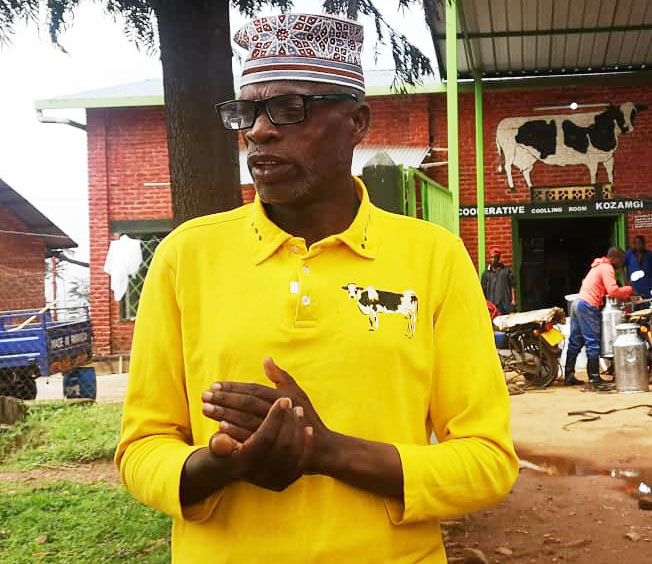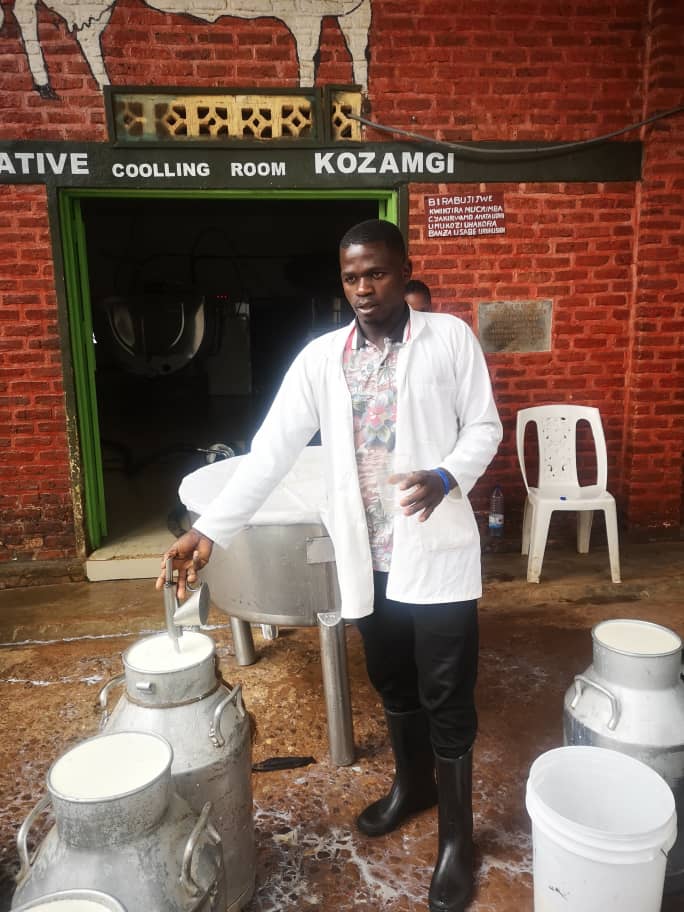World Vision support helps MCC improve quality in milk production and livelihoods of members
By: Jacqueline Natukunda - Communications Officer
It is a very busy morning at KOZAMGI Milk Collection Center (MCC) as farmers deliver milk. We notice there is lots of activity going on; from checking the quality of the milk, taking records, sieving the milk, pouring it in the coolers for storage to giving the retail suppliers milk to take to the market.
This is a typical morning at this workstation, all done under the supervision of Rashid, the coordinator of KOZAMGI MCC Cooperative in Rutare Sector, Gicumbi District.
“We deal in milk collection from cattle keepers and supplying it to the market. This cooperative started in 2013 with 50 members who paid 10,000 Rwfs as an initial share, the number of members has grown and is currently at 325 members with 137,500 Rwfs as shares per person,” says Rashid.

He added that “Before we became a cooperative, farmers supplied milk randomly and there was no organization at all, so one would work on their own to find a market for their milk and sometimes some farmers never accessed the market at all.”
To tackle this challenge, the farmers came together to form a cooperative so that they join efforts to see that milk reaches the targeted market, this is how the cooperative started.
“We had less knowledge and skills about the milk collection business by the time World Vision stepped in. World Vision support through training was immense and has led to the growth of our cooperative, we set goals together so that we track the success, we moved from 4000 liters to collecting between 7000-9000 liters,” says Rashid.
The cooperative members were trained in the management of the cooperative and financial literacy. These trainings enabled them to grow as a cooperative, and work as a team to reach their individual and collective goals.
“We never knew financial literacy, record keeping and as a business, we were not progressing. But now we can even be audited without fear. When the cooperative started, we had no car to transport the milk but now we have one, we have milk cans and also no longer use bicycles to transport milk but rather motorcycles. The cooperative now also has milk coolers that can carry 15,000 liters of milk from a capacity of 4,000 liters,” says Rashid
Rashid adds that, “After World Vision gave cows to farmers, milk production increased. Before, we would only get 1,200 liters from the cows we had, but after farmers received cows from World Vision, the milk production increased to 7,000-9,000 liters.”
Farmers who received cows got their lives transformed, they started supplying milk to the collection center which in turn paid them hence improving the livelihoods of their children and families.

“Before we were given cows, there was a lot of stunting and malnutrition among children but we now have enough milk in the community, both for sale and home consumption. When you get milk, you have money, you have come to save and some to use for getting basic needs hence improving the children and family’s welfare,” says Rashid.
World Vision also intervened and supported renovating the Milk Collection Center facility. It was not meeting the standards of a milk collection center as required by the Rwanda Bureau of Standards and Ministry of Agriculture and it was at the verge of being stopped from operating.
“With this support, our credibility was raised. After the inspection, we were ranked among the top 20 out of over 80 Milk collection centers in the country and also awarded a certificate yet before we were among the worst milk collection centers,” explains Rashid, adding that, “We encourage people to engage in cattle keeping because it provides daily income in the home, and also improves children’s health since they have enough milk for consumption. And also, when lactating mothers take milk, their babies’ health is assured since they get all the nutrients needed for proper growth.”
World Vision also supported the cooperative to set up a Veterinary pharmacy as they had given cows to the community, and there was a need for these animals to be treated to achieve their target production.
“The cooperative leadership requested support and World Vision responded positively by providing medicines that are sold to farmers at subsidized prices. Most medicines were expensive and not readily accessible for the farmers in case of need,” says Rashid.
Rashid appreciates World Vision so much for the far it has brought the cooperative, they still seek advice from the World Vision staff in their area and are convinced that without World Vision's support, the cooperative would not be where it is now.